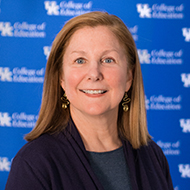Course Presenter

Ted Hasselbring has conducted research for the past 30 years on the use of technology for enhancing
learning in students with mild disabilities and those at risk of school failure. Dr. Hasselbring was a special
education teacher in New York. In 1977, he began his career in higher education as an assistant
professor at North Carolina State University. In 1982, Dr. Hasselbring joined the faculty of Peabody
College of Vanderbilt University where for eighteen years he served as the co-director of the Learning
Technology Center and conducted research on using technology to provide instruction in reading and
mathematics. This research resulted in several widely used computer-intervention programs for struggling
learners, including READ 180, FASTT Math, and Simon SIO. In 2000, Dr. Hasselbring moved to the
University of Kentucky as the William T. Brian Professor and Endowed Chair in Special Education
Technology. While at Kentucky, he also served as the executive director of the National Assistive
Technology Research Institute. In 2006, he returned to Vanderbilt to resume his research and
development activities in computer intervention.

Margaret E. Bausch, assistant professor in the Department of Special Education and Rehabilitation
Counseling at the University of Kentucky, earned a Master of Science Degree in Special Education
Learning Disabilities and a Ph.D. in Special Education Technology from the University of Kentucky. Dr.
Bausch spent nine years as a teacher of students with learning and behavior disorders before devoting
her efforts to research and development projects in assistive and instructional technology. She has
served as a co-principal investigator of the National Assistive Technology Research Institute, a federally
funded project designed to examine factors related to the planning, development, implementation, and
evaluation of assistive technology services in schools.
Currently, Dr. Bausch is serving as the principal
investigator of the Kentucky Assistive and Rehabilitative Technology Training grant that is providing
scholarships to prepare personal from varying fields to integrate instructional and assistive technology
into the school curriculum, post-secondary education, employment situations, and the daily lives of
persons with disabilities.
Partner Profile
Public Consulting Group, Inc. (PCG) is a leading public sector solutions implementation and operations improvement firm that partners with health, education, and human services agencies to improve lives. Founded in 1986 and headquartered in Boston, Massachusetts, PCG has nearly 2,000 professionals in more than 50 offices around the US, in Canada and in Europe. PCG’s Education practice offers consulting services and technology solutions that help schools, school districts, and state education agencies/ministries of education to promote student success, improve programs and processes, and optimize financial resources.